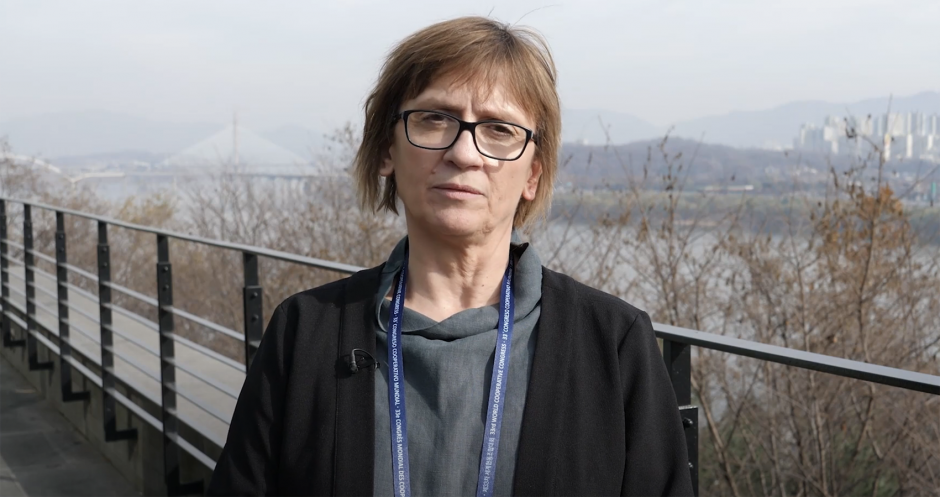Two preparatory events took place ahead of World Cooperative Congress – the International Cooperative Alliance (ICA) Cooperative Research Conference and the 3rd International Forum on Cooperative Law, from 28 to 30 November 2021 – which explored the idea of ‘Co-operative Identity’ through research and legislation.
ICA Cooperative Research Conference
The ICA Cooperative Research Conference had 190 papers submitted on the topic of Co-operative Identity. Of those, 80 people participated in Seoul on the ground, with 50 in-person and 100 online presenters contributing over the course of the conference. Chair of the ICA Committee on Cooperative Research, Sonja Novkovic, described the response they had received as “remarkable”.
“The topic of the Research Conference [was] the same as Congress, and that is ‘Deepening the Cooperative Identity’, said Prof Novkovic. “Researchers from all around the world have sent us their research pieces on identifying how co-operatives live and exhibit the Statement on the Cooperative Identity. Some of the papers explore the depth and operationalisation of the statement, but others also look at the outcomes and impact of co-operatives aligned with the Statement.”
Papers looked at the sustainable development goals and alignment of the outcomes of co-operative functioning with the SDGs. Delegates also talked about the values that underpin the Statement on Cooperative Identity and the diversity of values and cultures that feed into the co-operative identity that “align well with the intent of co-operation”.
“We had many participants from Korea, which is really wonderful,” added Prof Novkovic. “With the challenge of Covid, it is really quite impressive to see the number of people who gathered to actually exchange experiences and opinions.”
At a summary session following the conference, key takeaways from the sessions were shared by Prof Novkovic as well as by four young scholars who had been acting as rapporteurs across the conference sessions. The young scholars shared insights across four key areas: co-operative identity; co-operative innovation and entrepreneurship; co-operative global commitment; and the co-operative identity and the SDGs.

In her summary, Prof Novkovic fed back “clear calls for leadership” within the co-operative sector from the research community, particularly on the issue of climate, as well as a call to go beyond the SDG and ESG frameworks. She highlighted a need for co-ops to be “critical where criticism is needed” and show leadership in this area, to influence global efforts to “measure what matters”. Prof Novkovic concluded with a recommendation that called for the creation of a forum for co-operatives to exchange experiences in the arena of climate change and measurement, which she is hoping the UN Research Institute for Social Development will be a partner on.
Abstracts from the research conference will be published online, and some of the conference contributors will be invited to submit to the Review of International Co-operation.
3rd International Forum on Cooperative Law
The third International Forum on Cooperative Law also took place ahead of the Congress, organised by IUS Cooperativum (a community of international co-operative lawyers) and the ICA.
“The previous two were held in Montevideo and Athens,” said Santosh Kumar, director of legislation at the ICA. “This is the first time that this forum is being organised with the ICA, in the background of the 33rd World Cooperative Congress, so perhaps it doesn’t get better or bigger.”
The Law Forum had around 50 speakers enrolled, representing more than 30 countries, who explored two main topics: the relationship between the co-operative identity and co-op law and the harmonisation of co-operative law.
“For co-operative lawyers, this is quite interesting,” said Mr Kumar, “because the harmonisation of laws is an interesting subject, and the identity of co-operatives is something that is already harmonised to a large extent around the world thanks to the Statement on Cooperative Identity.”
The forum discussed technology, co-operative law principles, identity and education, and also heard international perspectives and recent developments on the work the ICA has done on legal framework analysis.
Summarising the event, Hagen Henrÿ, chair of the ICA Committee on Cooperative Law, described how the event’s two themes had been addressed.
On the relationship between the co-op identity and co-operative law, he highlighted the importance of the ICA Statement on Cooperative Identity, explaining that co-operatives “living and practising those principles have an influence on whether we have or do not have an emerging public co-operative law”.
On the subject of how to harmonise the interpretation of the co-operative principles through co-operative law, Prof Henrÿ laid out five recommendations: to integrate the issue of law into the thinking on co-operative identity; to recognise that the ICA Statement on Co-operative Identity is legally binding; to use the ICA’s resources through its Law Committee and director of legislation Santosh Kumar; to integrate the issue of co-operative law into the training of lawyers; and to overcome the sectoral divides seen in co-operative law.
Those who presented to the law conference will be given the opportunity to submit work to the Journal of Co-operative Law.
Consumer co-operative specialist Ann Hoyt, who chaired the joint summary session of the research and law events, ended by stressing the importance of recognising that the papers examining Co-operative Identity and the presentations and conversations heard during these two events “are a beginning to a much longer conversation and discussion among co-operators throughout the world”.